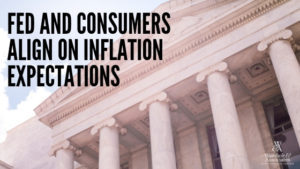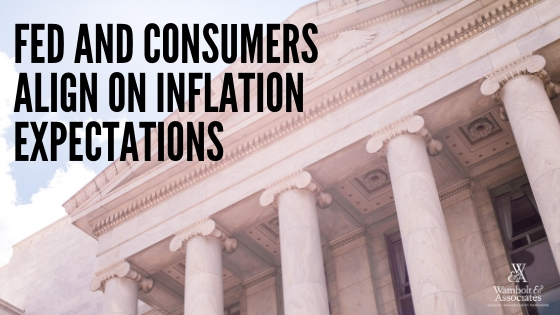The Federal Reserve hit pause on rate hikes in January. Consumers adjusted their inflationary expectations in February. Will this change in course continue?
The Fed hit the pause button in January in their steady march to increase rates. With inflation remaining near the Fed’s 2 percent goal, the Fed indicated the case for raising rates was weakening. “The U.S. economy is in a good place, and we will continue to use our monetary policy tools to help keep it there,” Chairman Powell stated in a press conference on Jan. 30, 2019.
The Fed raises rates when inflation heats up to slow runaway growth. A slowing U.S. and overseas economy has muted inflation concerns, leading the Fed to take a softer stance by holding rates steady.
Last year, the Fed gradually raised rates four times, increasing the cost of borrowing. With no immediate threats to economic expansion, fed officials postponed rate increases.
Joe public chimes in
The public’s inflation expectations eased as well for for both one- and three-year outlooks to 2.8% from 3% in January, according to the New York Fed’s Survey of Consumer Expectations. It was the first notable decline since April 2018.
Survey respondents said they are expecting little change in gas, college education, and rent in the next year. Significantly, medial care price growth expectations declines to a series low, with the public now seeing a 7.5% rise a year from now, down from 8.3% in January.
Whether inflationary pressures will ease long-term is uncertain. Leading up the Fed’s January decision, U.S. jobs data demonstrated that hiring and wage gains continued to be strong; the unemployment rate remained near historic lows. “Despite the positive outlook, over the past few months we have seen some crosscurrent and conflicting signals about the outlook,” Chairman Powell cautioned.
The Fed is still expected to raise rates when economic data deems it. The next Federal Open Market Committee is scheduled for March 19-20, where more clarity around conditions might cause inflation expectations to adjust course yet again.
Read more:
- Longer-Run Goals and Policy Strategy
- Statement Regarding Monetary Policy Implementation and Balance Sheet Normalization
- Consumers’ Inflation Expectations Decline in February
Follow Us on LinkedIn
Photo by Katie Moum on Unsplash
This commentary on this website reflects the personal opinions, viewpoints and analyses of the Wambolt & Associates employees providing such comments, and should not be regarded as a description of advisory services provided by Wambolt & Associates or performance returns of any Wambolt & Associates Investments client. The views reflected in the commentary are subject to change at any time without notice. Nothing on this website constitutes investment advice, performance data or any recommendation that any particular security, portfolio of securities, transaction or investment strategy is suitable for any specific person. Any mention of a particular security and related performance data is not a recommendation to buy or sell that security. Wambolt & Associates manages its clients’ accounts using a variety of investment techniques and strategies, which are not necessarily discussed in the commentary. Investments in securities involve the risk of loss. Past performance is no guarantee of future results.
Wambolt & Associates provides links for your convenience to websites produced by other providers or industry related material. Accessing websites through links directs you away from our website. Wambolt & Associates is not responsible for errors or omissions in the material on third party websites, and does not necessarily approve of or endorse the information provided. Users who gain access to third party websites may be subject to the copyright and other restrictions on use imposed by those providers and assume responsibility and risk from use of those websites.



